Unlock the Editor’s Digest for free
Roula Khalaf, Editor of the FT, selects her favourite stories in this weekly newsletter.
Thai lawmakers have elected a former businessman and political veteran known as the “cannabis king” as prime minister, the country’s third leader in just over a year.
Anutin Charnvirakul, who comes from a family that owns a major construction company, received 311 votes on Friday, easily surpassing the 247 needed from lawmakers in the lower house of parliament.
A conservative and staunch royalist who has been a kingmaker in Thai politics over the past decade, Anutin, 58, is best known for his support for the decriminalisation of cannabis.
Anutin stands to inherit a fragile political and economic situation.
Five prime ministers have been removed by the judiciary over the past 17 years. Thailand’s trade- and tourism-dependent economy has struggled to regain momentum after the Covid-19 pandemic, with GDP expanding just 2.8 per cent in the second quarter. It also faces 19 per cent “reciprocal” tariffs from the US, its largest export market.
Friday’s vote was triggered by the ousting last week of Paetongtarn Shinawatra as prime minister, after Thailand’s constitutional court found her guilty of ethics violations. Her predecessor, property magnate Srettha Thavisin, was also removed by the court for an ethical breach last year.
“Anutin’s elevation will certainly not put an end to this period of political uncertainty in Thailand,” said Ken Mathis Lohatepanont, a PhD candidate and political analyst at the University of Michigan.
He added that “minority governments have been rare in Thailand . . . which could put the policymaking process into further gridlock”.

Anutin, whose Bhumjaithai party, or Pride of Thailand, is the third-largest in parliament, secured the premiership with the help of the opposition People’s party, the largest political group. But as part of that agreement, he vowed to dissolve parliament within four months and call a general election.
Thailand is locked in “a recurrent pattern of elections leading to crises”, said Thitinan Pongsudhirak, a political scientist at Chulalongkorn University in Bangkok. “The turmoil continues.”
The People’s party, formerly known as Move Forward, won the most votes in the 2023 election but was blocked from power and its leader barred from politics for a decade over its call to reform the royal defamation law.
While the party backed Anutin on Friday, it will not join the new government. In addition to new polls, the party has also sought a constitutional referendum on replacing the 2017 charter, which was drafted by a military-backed government.
“This agreement will be very difficult to enforce,” said Lohatepanont, noting: “Bhumjaithai has not expressed particular interest in constitutional change prior to this point.”
Anutin’s elevation marked a blow for Paetongtarn’s populist Pheu Thai party, which had dominated Thai politics for two decades under the patronage of her father, Thaksin Shinawatra.
Pheu Thai on Friday put forward 77-year-old party grandee Chaikasem Nitisiri, as its prime minister candidate. He received 152 votes. There were 27 abstentions.
Anutin served as Paetongtarn’s deputy and interior minister during her 10-month premiership. But he also supported the government of former junta leader Prayuth Chan-ocha, who took power in a 2014 coup that deposed Paetongtarn’s aunt, Yingluck Shinawatra.
Anutin, who was health minister during the Covid-19 pandemic, was a strong backer of Thailand’s 2022 move to decriminalise marijuana though he has since supported efforts for more regulation.
Paetongtarn was suspended from office in July following the revelation of a phone call with Cambodia’s former leader Hun Sen in the run-up to deadly border clashes.
During the call, which was leaked by Hun Sen, Paetongtarn called him “uncle” and blamed Thailand’s military for escalating tensions, drawing accusations of undercutting Thai sovereignty. She apologised but explained her behaviour as a negotiating tactic.
Thaksin, a billionaire telecoms magnate, served as prime minister from 2001 to 2006 until he was also toppled by the military. He later spent 15 years in self-imposed exile avoiding graft charges.
He was acquitted last month in a separate case in which he was accused of defaming Thailand’s monarchy. Late on Thursday, Thaksin left Thailand for Dubai, where he spent much of his previous exile. He faces another court hearing on Tuesday related to his detention in hospital last year. He has promised to return ahead of the hearing.
To the Thai public, “what Thaksin did weakened the family”, while Paetongtarn’s conduct “disgraced” the once-powerful clan, said Thitinan. “The family name is in terminal decline.”


